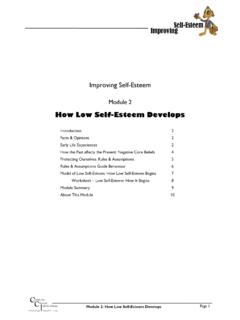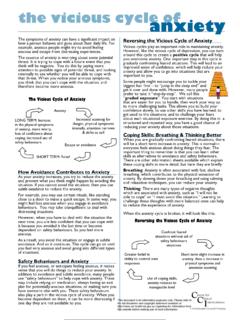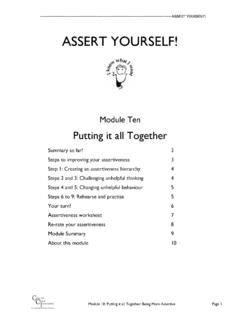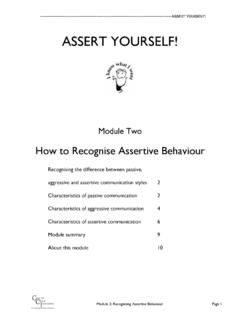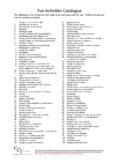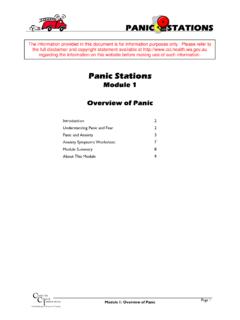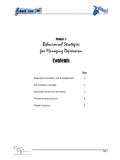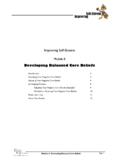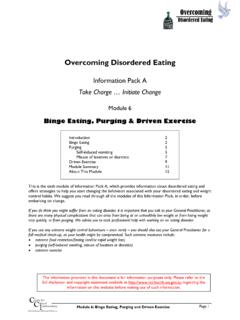Transcription of Overcoming Disordered Eating - cci.health.wa.gov.au
1 Overcoming Disordered Eating Overcoming Disordered Eating Information Pack A. Take Charge Initiate Change Module 7. Moods & Disordered Eating Introduction 2. What is Mood Intolerance? 2. Do I Have Difficulty Managing my Moods? 3. Learning to Manage Moods 3. Mindfulness 3. Worksheet: Mindfulness Skills Practice 6. Learning to Tolerate Distress 7. Worksheet: Distress Tolerance Skills 8. Worksheet: Distress Tolerance: Benefits & Costs 9. Emotion Regulation 10. Worksheet: Identifying & Labelling Emotions 12.
2 Module Summary 14. About This Module 15. This is the seventh module of Information Pack A, which provides information about Disordered Eating and offers strategies to help you start changing the behaviours associated with your Disordered Eating and weight control habits. We suggest you read through all the modules of this Information Pack, in order, before embarking on change. If you do think you might suffer from an Eating disorder, it is important that you talk to your General Practitioner, as there are many physical complications that can arise from being at an unhealthily low weight or from losing weight very quickly, or from purging.
3 We advise you to seek professional help with working on an Eating disorder. If you use any extreme weight control behaviours even rarely you should also see your General Practitioner for a full medical check-up, as your health might be compromised. Such extreme measures include: extreme food restriction/fasting (and/or rapid weight loss). purging (self-induced vomiting, misuse of laxatives or diuretics). extreme exercise The information provided in this document is for information purposes only. Please refer to the full disclaimer and copyright statement available at regarding the information on this website before making use of such information.
4 Centrelinical for C Interventions Module 7: Moods & Disordered Eating Page 1. Psychotherapy Research Training Overcoming Disordered Eating Introduction In the last module we described binge Eating , purging and excessive exercise as part of a vicious cycle that involves concern over weight and shape, and dietary restriction. In this module we will talk about another aspect of the vicious cycle: the role of moods in Eating disorders. We will discuss how some people have difficulty tolerating moods and managing them.
5 As a result, they resort to unhelpful behaviours in an effort to cope with, and overcome, intense mood states. We will explore more helpful strategies for managing your moods. Even if you don't think you have problems with tolerating moods, you might find the information and coping strategies provided here interesting or useful. What is Mood Intolerance? Some people have great difficulty tolerating negative moods. What do we mean by that? These people don't know how to deal with intense feelings and they are very sensitive to intense negative emotions ( , disappointment, depression, hurt, fear, guilt, anger).
6 So they use particular ways and means to manage their moods, and achieve short-term relief by avoiding or getting rid of those intense negative feelings. These ways and means come at a personal cost because they usually take the form of drinking alcohol, taking drugs, self- harm ( , cutting or burning), binge Eating , vomiting, or excessive exercising. In the long-term, these actions do not prevent the unwanted negative experience, and they can, in turn, cause additional problems. Therefore, mood intolerance can be understood as: sensitivity to, and difficulty tolerating, intense negative feelings to the extent that personally costly measures are used to try to avoid these feelings.
7 Mood intolerance can get in the way of Overcoming Eating problems. This is because people with Disordered Eating AND mood intolerance often resort to binge Eating , vomiting, or excessive exercising to get relief from intense feelings. Coping in this way only keeps the Eating disorder going. Below is a diagram that was also shown in Module 3. This diagram shows how an Eating disorder such as Bulimia Nervosa might develop and be maintained. We have also added mood intolerance to the diagram, showing that it can trigger binge Eating , vomiting, or excessive exercising and is one of the mechanisms that keep the Eating disorder going.
8 Self-worth based (largely) on: Eating habits, shape, weight Ability to control these Strict Dieting and Extreme Shape & Weight Control Strategies Preoccupation with Nutritional Deprivation Eating & Food & Physical Hunger Breaking Self-Criticism &. Dietary Rule/s All-or-Nothing Thinking Binge Eating Mood Intolerance Compensatory vomiting/laxative misuse/. excessive exercise Centrelinical for C Interventions Module 7: Moods & Disordered Eating Page 2. Psychotherapy Research Training Overcoming Disordered Eating Do I Have Difficulty Tolerating & Managing Moods?
9 Many people with Eating disorders resort to binge Eating (and, less often, purging, exercising or restricting food) when they are overcome with emotion and feel unable to cope. For some people it can have a numbing effect, for others it has a calming effect, and for some it can help take the edge off anger. To overcome Eating problems fully, you may also need to learn to overcome mood intolerance in other words, learn to deal with intense moods. First, let's find out if this is something you have difficulties with.
10 Here are a few questions for you to think about: Never Rarely Some Often Very times Often How often do you use alcohol and/or drugs when you feel upset? How often are you prone to outbursts of anger or rage? How often do you experience major changes in your mood? How often do you feel like you have to hurt yourself or others? How often do people say that you are emotionally unstable? How often do you eat to calm yourself down when you are feeling worried, anxious, or tense? How often do you eat to deal with angry feelings?
